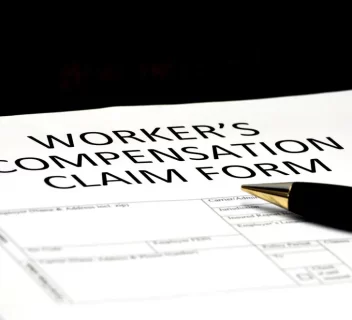EPLI Insurance vs Workers Comp: What Coverage Do You Really Need?
When a workplace issue arises, employees and employers often ask which insurance covers what: EPLI Insurance vs. Workers’ Comp?
Understanding the differences between these two types of coverage is crucial to navigating workplace injury, discrimination, or liability claims.
In the context of liability insurance vs workers’ compensation, it is important for businesses to understand the key differences between these policies to ensure proper protection.
In a world where workplace claims are becoming increasingly common, knowing how to protect yourself—or your business—is essential. Comparing EPLI and workers’ compensation is vital for comprehensive risk management.
This guide breaks down the basics of EPLI and Workers’ Comp, explores their advantages and disadvantages, and outlines who qualifies for what.
Insurance EPLI and workers’ compensation each serve unique purposes, and understanding both is necessary for comprehensive protection. We’ll also touch on how to prove disability discrimination at work, and how that intersects with both policies.
By the end, you’ll have a clear understanding of the key differences between EPLI and workers’ compensation, and why it’s important to know how each policy protects your business and employees.
What Is Workers’ Compensation?
Workers’ compensation is a form of insurance that provides wage replacement and medical benefits to employees injured in the course of employment.
In most states, workers’ compensation is a legal requirement, and employers must have a workers’ compensation policy to provide workers’ compensation insurance coverage.
Workers’ comp coverage and workers’ compensation cover include benefits for job-related injuries, work-related injuries, occupational illnesses, and repetitive stress injuries. This insurance is designed to protect employees in the event of workplace accidents and to support an injured employee when they need help.
In exchange, the employee typically waives the right to sue their employer for negligence.
Purpose for Employees:
- Pays for medical bills, medical costs, rehabilitation, and a portion of lost wages.
- Covers temporary and permanent disability.
- Offers death benefits to dependents in case of fatal injuries.
Purpose for Employers:
- Protects employers from lawsuits related to workplace injuries, shielding them from costly legal claims and associated expenses.
- Promotes a safer work environment.
- Offers a predictable method for resolving employee injury claims.
Workers’ compensation does not cover emotional distress, discrimination, or harassment. That’s where the EPLI Insurance vs. Workers’ Comp debate becomes relevant.
What Is EPLI Insurance?
Employment Practices Liability Insurance (EPLI) covers businesses against claims made by employees alleging discrimination, wrongful termination, harassment, and other employment-related issues.
EPLI is specifically designed to address employee-related risks such as wrongful termination, harassment, and discrimination.
EPLI protects businesses from the financial impact of employment-related lawsuits.
Purpose for Employees:
- Provides a pathway to compensation in lawsuits involving rights violations, such as discrimination or retaliation.
- Covers settlements or awards related to non-physical harm at work.
Purpose for Employers:
- Protects against the high costs of defending employment-related lawsuits.
- Can cover legal fees, judgments, and settlements.
- Shields the business even in complex legal disputes.
When exploring EPLI Insurance vs. Workers’ Comp, the distinction is clear: workers’ comp addresses physical harm, while EPLI deals with legal and emotional harm.
The Advantages: EPLI vs. Workers’ Comp

Understanding the benefits of each insurance type can help employers decide which—or both—to maintain. Here’s a breakdown.
Having both EPLI and workers’ compensation ensures comprehensive coverage, providing businesses and employees with complete protection against a wide range of risks.
Workers’ Compensation Benefits for Businesses:
- Legal Shield: Minimizes litigation related to physical injuries.
- Compliance: Required in most states, protecting the business legally.
- Financial Burden Relief: Helps reduce the financial burden on businesses by covering costs associated with workplace injuries.
- Predictability: Offers a structured way to handle injury claims.
EPLI Insurance Benefits for Businesses:
- Legal Coverage: Covers lawsuits based on discrimination, harassment, and wrongful termination.
- Protection from Financial Loss: Includes legal fees and settlement costs.
- Wide Coverage: Protects from lawsuits by current, former, or even potential employees.
In the EPLI Insurance vs. Workers’ Comp comparison, each serves a different, critical business function.
The Disadvantages: EPLI vs. Workers’ Comp
While beneficial, these insurance types also have downsides. The associated costs and claim payouts for both Employment Practices Liability Insurance (EPLI) and workers’ compensation can be substantial, with workers’ comp costs often representing a significant financial burden for employers.
Workers’ Compensation Drawbacks for Businesses:
- Costly Premiums: Premiums can be high depending on injury rates.
- Limited Scope: Doesn’t cover emotional or legal disputes.
- Potential for Fraud: Risk of exaggerated or false claims.
EPLI Insurance Drawbacks for Businesses:
- Exclusions Apply: Doesn’t cover all employee lawsuits (e.g., wage/hour claims).
- Claims May Increase Premiums: Higher frequency of claims can spike costs.
- Deductibles and Caps: Often includes high deductibles and payout limits.
EPLI Insurance vs. Workers’ Comp both offer strong protections, but employers should be aware of the potential limitations before relying solely on either.
Who Is Qualified to Receive Workers’ Compensation / EPLI Coverage?
Understanding who qualifies can clarify which option fits the situation. Employment laws determine eligibility for workers’ compensation and EPLI coverage, with requirements and exemptions that may vary by state.
It is important for a business owner to understand who qualifies for each type of coverage to ensure proper protection and compliance.
Workers’ Compensation:
Employees generally qualify if:
- The injury occurred during the course of employment.
- The employee was performing job duties.
- The injury is not due to intoxication or intent to self-harm.
Independent contractors are typically not covered.
EPLI Coverage:
EPLI protects the employer rather than the employee. However, employees may benefit if:
- They file a valid discrimination, harassment, or wrongful termination claim.
- The employer has active EPLI coverage at the time of the event.
EPLI does not require a physical injury. A claim like emotional distress following disability-related retaliation could be covered—especially if the employee knows how to prove disability discrimination at work.
How Long Do Benefits Last?
Coverage durations differ dramatically depending on the type of insurance.
Additionally, claims history can impact both the duration and cost of future coverage for EPLI and workers’ compensation, as insurers may adjust premiums or policy terms based on previous claims.
Workers’ Compensation:
- Temporary Disability Benefits: Last until the worker reaches maximum medical improvement (MMI).
- Permanent Disability Benefits: Can last for years or even for life, depending on severity.
- Medical Benefits: May continue indefinitely as long as they relate to the original injury.
For detailed information on how long workers’ compensation lasts, visit our resource.
EPLI Insurance:
- Coverage Duration: Tied to the policy period.
- Claims-Made Basis: Policies usually only cover claims made during the active policy term.
When comparing EPLI Insurance vs. Workers’ Comp, note that Workers’ Comp provides long-term support for physical injuries, while EPLI focuses on defending claims made within the policy window.
How the Claims Process Works for Workers’ Compensation and EPLI Insurance

Navigating the claims process for Workers’ Compensation and Employment Practices Liability Insurance (EPLI) is essential for both employers and employees.
Understanding how to initiate and manage a claim can make a significant difference in the outcome, ensuring that employees receive the benefits they deserve and that employers are protected from unnecessary financial and legal risks.
Each insurance policy—whether it’s workers’ compensation or practices liability insurance, EPLI—has its own procedures and requirements, so knowing the steps involved is key to a smooth claims process.
Filing a Workers’ Compensation Claim
When a workplace injury or occupational illness occurs, the first step is for the employee to notify their employer as soon as possible.
Prompt reporting is crucial, as delays can complicate the claims process and potentially impact eligibility for benefits.
Once notified, the employer is responsible for providing the injured worker with the necessary claim forms and instructions on how to proceed.
After the employee completes the claim form, it is submitted to the workers’ compensation insurance carrier. The insurance company will then review the details of the incident, including medical reports and any supporting documentation.
If the claim is approved, workers’ compensation covers medical expenses, lost wages, and rehabilitation costs, helping injured workers recover without the added stress of financial hardship.
This no-fault system means employees do not have to prove employer negligence to receive benefits—coverage is provided simply because the injury or illness is work-related.
Employers’ liability insurance comes into play if an employee sues the employer for damages related to a workplace injury, such as in cases of employer negligence.
In these situations, employers’ liability insurance helps cover legal defense costs and any potential settlements or judgments, offering an extra layer of protection beyond standard workers’ compensation coverage.
Contact 1-800-THE-LAW2 for a Free Consultation
Understanding the difference between EPLI Insurance vs. Workers’ Comp can help both employers and employees take the right steps when a workplace issue arises.
It’s important to review your insurance policies and understand the differences between liability insurance vs workers’ compensation, as each offers different protections for workplace injuries and legal claims. Whether you’re dealing with a work-related injury or a rights violation, knowing the strengths and limits of each coverage type is essential.
If you believe your employer retaliated, discriminated, or failed to accommodate your disability, knowing how to prove disability discrimination at work is just as important as understanding which insurance might apply.
Employee claims can result in significant legal costs and legal expenses, and employers’ liability coverage can help cover other legal costs not included in standard workers’ comp.
Call 1‑800‑THE‑LAW2 and we’ll connect you with an independent attorney in our network who can review your situation.
Private insurance companies play a key role in providing these coverages, so choosing the right policy is crucial for protecting your business from potential risks.
Make informed decisions with professional legal insight—because when it comes to EPLI Insurance vs. Workers’ Comp, clarity is power.




